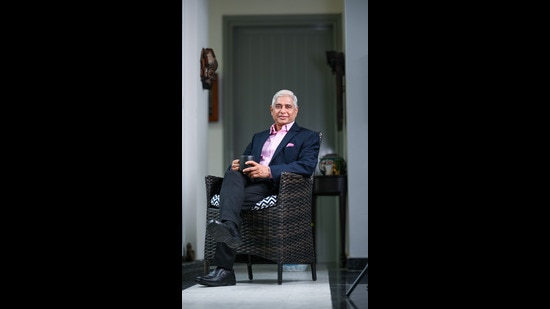
Word famous: Vikas Swarup of Q&A / Slumdog Millionaire, discusses his new book
9 months ago | 111 Views
It took Vikas Swarup about 10 weeks to write his debut novel, Q&A, in 2005. His latest, his fourth in the genre that he calls “social thrillers”, comes after an 11-year gap, and was three years in the making.
The Girl with the Seven Lives was released by Simon & Schuster this week. “I wanted to once again explore a strong first-person narrative, but with a morally complex character this time around, who would feel more real in today’s world,” he says.
Swarup knows a little something about moral complexity. The former diplomat, now 63, retired in 2021 as a secretary with the union ministry of external affairs. He has been official spokesperson for that ministry, toured the world, and served at embassies in countries ranging from the US and UK to South Africa and Japan.
Swarup is best-known for Q&A, which was adapted for the screen as the Oscar-winning film Slumdog Millionaire (2008). The book cuts across squalor and glory to tell the strange story of how Ram Mohammad Thomas, a poverty-stricken waiter in Mumbai, wins a bounty on a quiz show.
The Girl with the Seven Lives is darker. The protagonist, 25-year-old Devi, is kidnapped by a masked gunman who threatens to put her life up for auction online and let the highest bidder determine her fate. Except, it’s not a victim-villain tale. She’s hiding something; her captor seems to know what it is. He is demanding that she confess.
The plot hurtles between Delhi, Punjab, Kerala, Goa and Mumbai, offering a peek into fake-degree rackets, India’s obsession with godmen, and the horror stories of juvenile remand homes.
“Q&A was a relatively safe story of a lovable character,” Swarup says. “My mission now is to offer a more layered, multidimensional view of India, through a flawed character that the reader will still somehow root for at the end.”
***
A lot has changed about how Swarup writes. His first book was written on empty mornings, towards the end of his time at the Indian high commission in London, after his family had moved back to Delhi.
As it rose up the best-seller charts, “second-book syndrome hit,” he says. The pressure to produce another winner was immense, and it would take about 18 months to finish each of his next two works, Six Suspects (2008) and The Accidental Apprentice (2013).
Then he was appointed official spokesperson for the external affairs ministry. As he travelled to 40 countries over two years, there was little time to write. Even weekends became a thing of the past when he moved to Canada in 2017. “I was not prepared for how often the Indian diaspora in Canada needed the Indian high commissioner at every little community event,” he says, laughing.
Since he retired, he’s been writing every day. He sits at his desk in his Greater Noida home from 5.30 am to 9 am. In these golden hours of quiet and stillness, his characters come to life.
The biggest challenge with his latest book was accurately representing the experiences and worldview of an underprivileged woman, as a male writer, Swarup says. That’s where his wife, artist and photographer Aparna Swarup, stepped in. “She became a touchstone, reading my drafts and helping me with perspective on the female characters.”
His greatest critics, he adds, are his sons: startup investor Aditya Swarup, 32, and singer-songwriter Varun Swarup, 28. They revel in his success and stand by him in a slump, “but they do not mince words.”
***
Writing has always been a visual experience for Swarup. “I write words as I imagine the events playing out in my head, which is probably why the transition to screen is easier,” he says. Six Suspects, a tale of crimes, secrets and people who aren’t what they seem, was recently adapted as the web series The Great Indian Murder (2022).
Raised in the ’60s and ’70s in a family of lawyers in Allahabad, Swarup grew up with a love of reading. His grandfather had an extensive library, so he was able to read widely and eclectically. He picked the civil services because preparing for the exam let him do what he loved: pore through books on history, psychology and philosophy.
It was this history with literature that helped him take the leap from reader to writer at 42. “Reading lets you get into the consciousness of a writer. It drives you to decode the deeper meanings and question holes in the plot,” he says.
His career as a diplomat helped. “We are trained to use words very carefully and that played an integral role in my becoming a writer.” His life in the Indian Foreign Service also offered him rare insight into the ways the human mind works. And being a successful writer opened doors for him as a diplomat.
When posted as consul general in Osaka, for instance, he was invited to meet the governor within a week of his arrival. “It usually takes up to three months for such a meeting to be scheduled, but I was invited because Slumdog Millionaire was all the rage then.”
He has worked to use these platforms, he adds, to paint a vivid picture for the West, of our country beyond its stereotypes.
***
With his latest book now out, all Swarup sees ahead of him is open road.
Ideas for future fiction projects jostle in his mind. “I also find myself drawn to the world of non-fiction, and perhaps a project involving geopolitics or artificial intelligence.”
For now, he is enjoying life in retirement, and the luxury of having too much time on his hands. “I sometimes have to ask my wife what day it is. It feels unreal,” he says, “unreal in a good way.”
Read Also: the girl with the seven lives: read an exclusive excerpt from vikas swarup’s new book




















